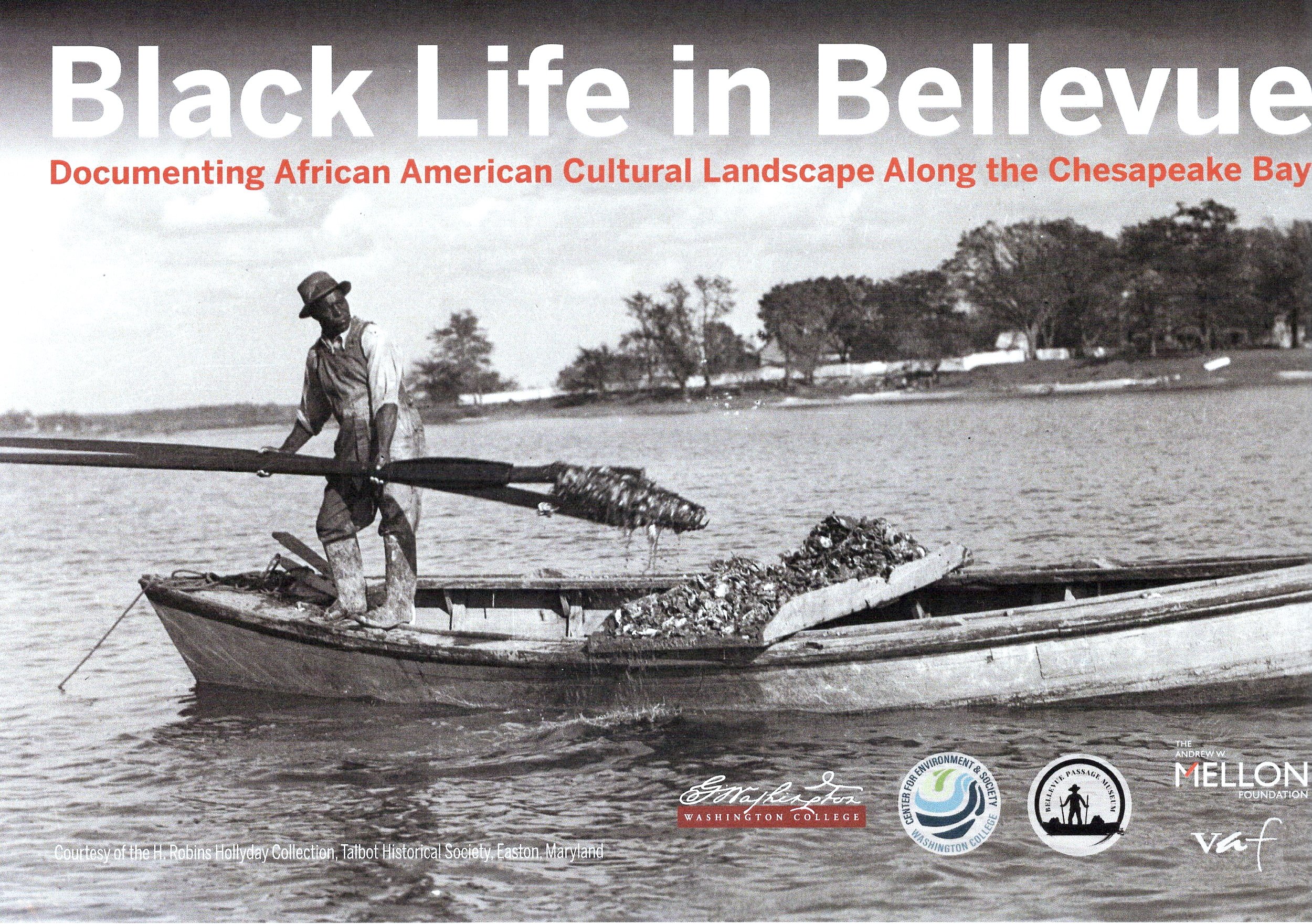Black Life in Bellevue Field School Returns for July 2023
Returning for its second year, we welcome the 2023 cohort of the Black Life in Bellevue Field School presented in partnership with Washington College’s Center for Environment and Society. The Field School is driven to give African Americans the tools and experience to research their heritage and design interpretive programming and tourism that will benefit their communities. Learn more about the amazing students in this year’s program below.
Mashayla Billups
Mashayla is a senior community development major and history minor from Louisville, Kentucky attending Howard University. As a student of community development and history, she is interested in preservation and placemaking as a resource for community and economic development. Her most immediate goal after graduating in the fall of 2023 is to attend graduate school for her Ph.D. in History. Her ultimate goal is to continue researching and preserving the heritage, space, and people of African American communities.
Tiffany B. Grantham
Tiffany is the creator of CreatiffWriting, a brand that provides a virtual space, writing prompts, and music to inspire writers to be and stay creative. A native of North Carolina, Tiffany is a Library Associate for the Charlotte Mecklenburg Public Library and writer for the online blog Sistah Girls Book Club. She is an alumna of North Carolina A&T State University and received her M.F.A in Writing from Lindenwood University and a Post Master's Certification in University and College Teaching Online from the University of North Carolina at Charlotte. Her first appearance as a contributing writer is in Black Powerful: Black Voices Reimagine Revolution.
Sidney Rose McCall
Sidney is a Florida-raised historian and community intellectual who studies the histories of environments and ecosystems connected to the Trans-Atlantic Slave Trade and its present-day afterlives. Her academic and liberation work are both rooted in nurturing stories immersed in decolonized language and historical frameworks that help examine the interwoven narratives between race, identity, (hu)manmade landscapes, and the natural world. Along with making antiracist resources more accessible to the public, she works extensively alongside other community bridge builders and scholar-activists to amplify the histories and lived experiences of people across cultural and color lines. She is currently pursuing her doctoral degree at the College of William and Mary, the second-oldest higher education institution in the United States and one of the many early American colleges that utilized enslaved labor in both the construction and day-to-day life on campus.
Rebekah Simcha
Rebekah is a Ph.D. student in the Harriet Tubman Department of Women, Gender, and Sexuality Studies at the University of Maryland. She received my M.A. in Critical Ethnic Studies and her Bachelor's in English with an emphasis on creative writing. Her research focuses on the conditions that have allowed her former home-state of Alaska to lead the nation as, “the most dangerous state for women.” Rebekah is interested in the lived experiences of Black bodies on the margins in Alaska. She am also interested in the ways Black folks heal, resist, and breathe through the violence that threatens to engulf us. In her work, she uses oral history, archival research, and creative methods to explore the relationship between Alaskan landscapes, bodies, violence, and to imagine the capacity of worldbuilding.
Alex Singleton
Kennedy Sledge
Xavier Smalls
As a rising junior at Washington College, Xavier diligently double majors in anthropology and environmental studies while minoring in Museum, Field, and Community Education. He is also a part of the Tri-Beta Biological Honor Society, Libby and Douglass Cater Society of Junior Fellows, National Society of Leadership and Success. As a career, he is interested in either doing state and/or federal government work that pertains to cultural and environmental diversity and justice or pursuing a career in museum administration and education.
Ebram Victoria
Ebram is a recent graduate of the Master of Landscape Architecture program at Morgan State University. Prior to graduate school, he received a Bachelor of Science in Corporate Communication and a minor in Philosophy from the University of Baltimore. As owner and operator of an environmental design and build company, his work focuses on using hybrid models of green infrastructure to reclaim and create landscapes that provide extrasensory experiences; spaces that remind us (and the birds, bees, and butterflies) of Nature's allure with texture, color, and smells. Ebram plans to continue his research pertaining to Nature as therapy in the PhD program in Architecture, Urbanism, and the Built Environment at Morgan State University in the Fall of 2023. In an attempt to understand the science behind Nature’s allure, his present research aims to elevate a conversation around designing with Nature to generate environmental biological therapies, and the expansion of Nature’s existing ecosystem services to include the protection and promotion of human homeostasis, mind, body, and spirit.
Michael J. Chiarappa
Michael is Co-Director of the field school. He received his Ph.D. from the University of Pennsylvania and is Research Professor of Chesapeake Regional Studies and Director of Cultural and Natural Resource Initiatives at Washington College’s Center for the Environment and Society. Dr. Chiarappa was previously Professor of History at Quinnipiac University and a faculty member in History and Environmental Studies at Western Michigan University. He is co-author of Fish for All: An Oral History of Multiple Claims and Divided Sentiment on Lake Michigan (2003), co-editor of Nature’s Entrepot: Philadelphia’s Urban Sphere and Its Environmental Thresholds (2012) and the author of articles focusing on vernacular architecture/landscapes, regional material culture, and marine environmental history. Dr. Chiarappa’s research and teaching is focused in the areas of American environmental history, the history of America’s built environments and landscapes, American maritime history, and local/regional history. He is also specializes in public history and historic preservation and formerly co-directed the Public History Program at Western Michigan University where he taught courses in historic preservation, documentation methods, and cultural resource management. He has conducted numerous field schools focusing on historic preservation, maritime preservation, museology, oral history, and local history and has worked on historic preservation, maritime preservation, and public history projects in the Middle Atlantic, New England, Chesapeake and Great Lakes regions, and in the Pacific Islands. He is currently co-editor of the Vernacular Architecture Forum’s journal, Buildings and Landscapes and serves on the Scholarly Advisory Board of the Gilder Lehrman Institute for American History. A graduate of the Munson Institute of American Maritime Studies and a former member of the Board of Directors of the Vernacular Architecture Forum, he has worked extensively with a variety of museums and government agencies, including the Smithsonian Institution and the National Park Service.
Janet Sheridan
Janet is Co-Director of the field school and is a cultural landscape historian and historic preservation consultant based in Salem County, New Jersey. She holds a master's degree from the University of Delaware, and attended the Laval Université Summer Field School in Built Heritage and Cultural Landscapes in Gaspé, Québec. The diversity of fields she has engaged in over the years—ecology, photography, civil engineering, historic architecture, historic preservation planning and advocacy—she applies to the study of historic cultural landscapes. Her research, much of which has been funded under research grants from the state of New Jersey, has documented African American sites, farmsteads, outbuildings, and pre-industrial timber frame architecture in southwestern New Jersey along the Delaware Bay. Her first African American research project followed her discovery of the 1798 home of Reuben Cuff, one of the founders of the African Methodist Episcopal Church in 1816. After that, she investigated the history of Marshalltown, a forgotten antebellum free-Black settlement, which she surveyed and listed as a historic district on the New Jersey and National Registers of Historic Places in 2013 and which received a statewide award in 2021.
Monica T. Davis, Field School Assistant
Monica T. Davis is an architectural historian, designer, and historic preservationist, and participated in the 2022 Bellevue Field School. She is currently the Director of the Waters Edge Museum in Oxford and Bellevue Passage Museum. Her research explores the migration of Shotgun houses the significance of African American Historic Districts, and she uses preservation practices as an economic stability tool. Her Preservation field and architectural design experiences began in Eastern North Carolina. She obtained ca. 1910 historic shotgun houses in a declining African American Historic District, listed on the National Register of Historic Places in 1988. She found that the historical significance of this architectural house type and revitalization of this neighborhood could uplift and educate its residents. Her passion for the preservation of this community led to the founding of Rebirthing Our Cultural Kingdom Foundation (R.O.C.K.), where she spearheaded and facilitated workshops on the cultural heritage of historic districts, architectural terminology, building techniques, and hands-on craftsman skills. As the co-founder of R.O.C.K., she has collaborated with local preservation non-profit organizations and presented her thesis research findings to educate a vast range of professionals and residents on the historic significance of East Wilson.
Monica’s vast archival research experiences have led her to obtain architectural historian positions in Honolulu, Hawaii. She completed Historic American Buildings Survey (HABS) and Historic American Engineering Record (H.A.E.R.) research reports.
Monica earned her B.S. in Biology and Forensic Science at UNC-Wilmington and her Master of Fine Arts degree in Interior Architecture and Post-Baccalaureate Historic Preservation Certificate at UNC-Greensboro. She is currently pursuing a Master of Preservation Studies degree at Tulane University.
Marcus Smith, Field School Assistant
Marcus Smith is from Houston, Texas and participated in the 2022 Bellevue Field School. Currently, he is pursuing his Ph.D. in Afro-American Studies at the University of Massachusetts Amherst. His research interests include the study of domestic and international social movements in the African diaspora, the history of the Southern US, and the construction of race, ethnicity, and nationalism in the US, especially as it relates to interracial political and social relationships.












